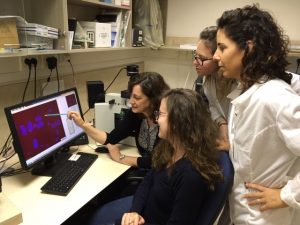Telomeres are the structures that protect linear chromosome ends. Shortening of telomeric DNA is strongly linked to the process of aging in several cell types in the human body, and almost all cancers must maintain a minimal telomere length in order to survive. Dysfunctional telomeric function occurs in various human genetic diseases.
Our laboratory focuses on mammalian telomere function in health and disease. In particular we are interested in the epigenetic characteristics of human telomeres. As model systems we utilize cells from human syndromes with abnormal telomeric phenotypes. We generated induced pluripotent stem cells from patient cells and differentiated them into skin cells to recapitulate the abnormal telomeric phenotype. We study whether correction of mutations in patient cells by genome editing can rescue the telomeric abnormalites.
Our research takes advantage of a wide diversity of techniques, among them molecular biology, high throughput sequencing, bioinformatics, molecular cytogenetics, microscopy, stem cell culturing and differentiation, genome editing and more.

